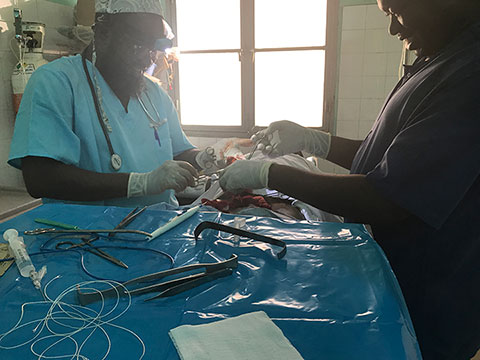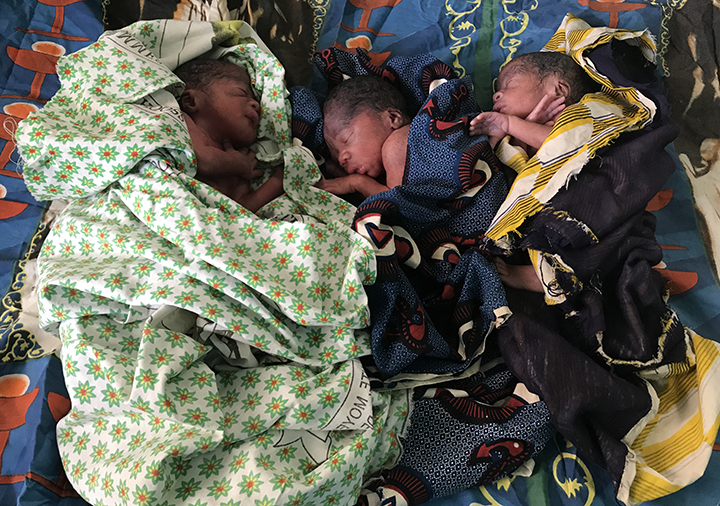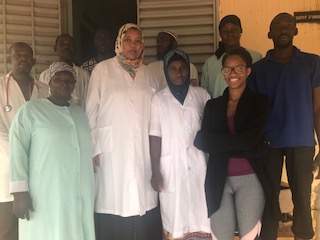Home » News » TIPs Student Grant: Summer Research in Mali
TIPs Student Grant: Summer Research in Mali
Posted by anderc8 on Tuesday, October 31, 2017 in News, TIPs 2016.
Written by Garsy Presumey-Leblanc (Vanderbilt University, Class of 2018)
This summer, I was awarded a Trans-Institutional Programs (TIPs) Student Grant to travel internationally and study a topic entirely of my choosing. As an undergraduate student double majoring in Medicine, Health and Society and Religious Studies (and with aspirations to enter the medical field), I wanted to go somewhere where I could combine those interests and gain first-hand shadowing experience.
My advisor, Prof. Dianna Bell performed her PhD research in Ouélessébougou, Mali, and offered me the opportunity to travel there. In Mali, 95 percent of the population is Muslim. In today’s society, Islam is looked at as a terroristic religion so it is vital to understand and unpack not only the cultural significance, but how it may benefit the societies in which it is practiced. In a third world country like Mali, where medicine is scarce and medical treatment is dependent on the generosity of foreign missionaries, it is necessary to observe factors that may contribute to how medical care is performed and treatment distributed. My study was aimed at looking into whether principles, especially restrictive ones, of the Islamic faith affect how medical care is provided in the rural town of Ouélessébougou, Mali. This research provided insight into how cultural factors can contribute to the understanding of medical care.

Director of the clinic, Dr. Bagayoko, and Dr. Konate performing surgery
For two and a half months, I shadowed doctors at Clinique Paix in Ouélessébougou, Mali, several days a week, observing patient-doctor interactions and asking a lot of questions! Each day, I prepared a series of questions regarding the potential correlations between Islam and medicine. During my experience, I conversed with doctors, patients, distributors and medical students.
For my study, I tracked three areas:
- The exciting surgical procedures such as cesarean sections, hysterectomies, childbirths and circumcisions;
- The clinical on-goings of the clinic, like how they handle walk-ins, etc.; and
- Religious discussions I had with doctors, nurses and medical staff.
My hypothesis had been that devout Muslim followers in Mali who were involved in medical care would prioritize their religion over the nuances of treatment. My thought here was that restrictive mandates in the faith could prove to be hindrances in Malian medicine. However, my hypothesis proved to be incorrect. Although each doctor held their own religious beliefs, medical care came first. If it was necessitated, a male doctor could perform a gynecological exam on a female patient. In fact, after many long discussions, the conclusion was the life was to be preserved at all cost and this is religiously justified. In the Quran, God orders his followers to value each life which he created in his own image. Therefore, doctors who do not prioritize life are not following Quranic teachings. For example, if a pregnancy is harmful to the mother, the pregnancy can be terminated even though abortion is against Sharia law. There exists a symbiosis between Islam and medicine as both value life above all else regardless of race, gender, class, etc.

These triplets were birthed during my stay.
If life is so highly valued in the Islamic that medical treatment is symbiotically compatible, then perhaps the Western world can stand to look at the religion differently and separate it from the actions of a few misguided, terroristic followers. Looking at how religion affects medical treatment can also help in observing how other cultural factors work in tandem and also show how religion does not have to be seen as an oppressive force meant to complicate and hinder infrastructure. It demonstrates that religion and medical science do not have to be separate, as shown by the presence of small mosques on the grounds of Clinique Paix. There are important aspects to not only studying the science of medicine, but social factors that dictate how medical care is received, provided, manipulated and furthered.
If you have any questions or comments, feel free to leave them in the space provided below, and let me know whether or not you’ve noticed medical treatments affected by cultural aspects.

